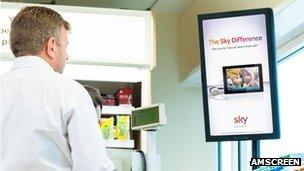Tesco petrol stations use face-scan tech to target ads
- Published
- comments

Tesco is installing face-scanning technology at its petrol stations to target advertisements to individual customers at the till.
The technology, made by Lord Sugar's digital signage company Amscreen, will use a camera to identify a customer's gender and approximate age.
It will then show an advertisement tailored to that demographic.
Tesco says the screens will be rolled out across all 450 of its forecourts in the UK.
"It's like something out of Minority Report," said Amscreen's chief executive Simon Sugar, Lord Sugar's eldest son.
"But this could change the face of British retail, and our plans are to expand the screens into as many supermarkets as possible."
A Tesco spokeswoman said: "This is not new technology."
"No data or images are collected or stored and the system does not use eyeball scanners or facial-recognition technology", she added.
'Ethically deployed'
The length of someone's hair could be used to work out their gender, she said.
Privacy campaigners said companies had to tell their customers they were using the technology.
Nick Pickles, of Big Brother Watch, said: "If people were told that every time they walked into a supermarket, or a doctor's surgery or a law firm, that the CCTV camera in the corner is trying to find out who they are, I think that will have a huge impact on what buildings people go into."
Technology expert Tom Cheesewright: "So much of this stuff happens today online already"
Systems could only be "ethically deployed" if customers agreed to opt in to having their behaviour tracked, he added.
Philip James, joint head of technology at Pitmans law firm, argues that this technology is similar to the way social media sites tailor adverts to users based on the content of their profiles.
"The capture of facial signatures represents a potentially much greater infringement of customers' privacy in the absence of prior consent," he said.
The screens are expected to reach five million customers.
- Published30 July 2013
- Published22 October 2013
- Published12 August 2013